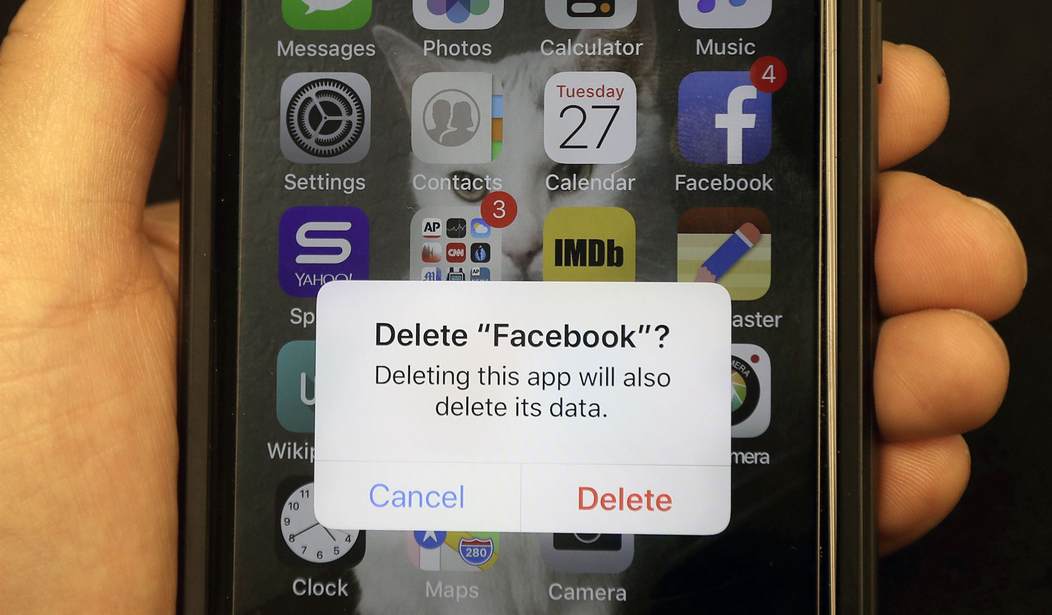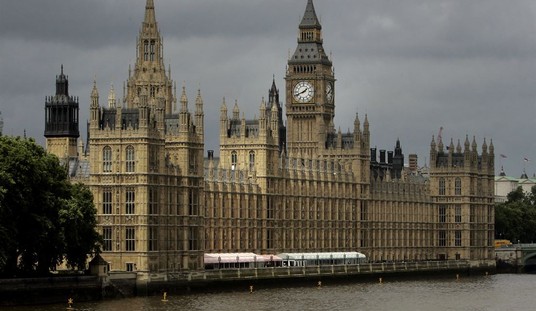Their rush to punish could become their own undoing.
In the climate change fiasco of a film ‘’The Day After Tomorrow’’ we are presented with a number of ridiculous premises. One, in particular, came to mind this weekend with the oppressive acts we saw emanating from Silicon Valley. In a later scene a weather system descends on New York, delivering a massive drop in temperature in a matter of seconds, so frigid that it manages to freeze a helicopter in mid-air. Jake Gyllenhaal’s character sees this frosty threat and runs to get back to a safe room where there is a fireplace burning, racing through hallways that become encrusted with ice.
Yes, they actually staged that. It was a chase scene — with cold.
Dumb as that premise was we actually felt something similar this weekend, in a manner that had nothing to do with the environment. The rapid way the technology sector was able to reach out and silence major figures and outlets in one day was not just chilling, but a rapid attack to freeze out opposition voices.
The web giants of this country exhibited a deeply troubling level of power in the past week, but in their zeal to exact their influence these tech titans may have unintentionally created problems for themselves. Things began with Twitter initially blocking President Trump’s account a month or so back, in the name of election security. Following the mob scene in D.C. last week they flexed these digital muscles once again, and then things escalated between the major companies driving our tech sector.
Soon after the melee in the Congressional chambers, the President’s Twitter account was again locked down. FaceBook ramped that action up, and suspended his account outright, and then Twitter followed suit. The company then took down the official Presidential Twitter account as well. This only begins the unforeseen minefield these companies might be stomping through today
Consider this; years ago a court ruled that it was unlawful for the President to block people on both his personal and his POTUS accounts. The reasoning being was his tweets are deemed as part of the public record of the Presidency. In its ruling, the court declared that when Trump blocked anyone on the account is became a case of ‘’Unconstitutional viewpoint discrimination’’. This leads to the question — if he was prevented from denying access to his messaging how is it acceptable for the provider to deny his messaging outright? Did they not discriminate against his viewpoint with this action?
This turned darker, as the tech companies behaved like a supervillain imbued with newly-discovered powers. They turned their attention elsewhere, looking for who next they could possibly bring down with their forces. Aided by a press corps insisting that what we had witnessed last Wednesday was a coup attempt, it was declared that insurrection had been planned on the social media platform, Parler. With the charge of treason hanging heavy in the air this weekend the website became the next target.
First Apple, then Google, announced they were taking down the popular social media site from being available in their app stores. At the time Parler was the number app in popularity. Then next Amazon made the draconian announcement; it would be removing Parler from its Amazon Web Service, killing the site on the web. A number of other tech vendors that had been working with Parler also left, doing so instantly so that the systems were left unprotected and hackers were able to access the data.
There are a number of people on the web who are mocking Parler for being dependent on Amazon and making it possible for the company to just pull the virtual plug like this. But there is another company that operates on the AWS framework in a similar fashion – Twitter. This becomes significant moving forward.
The entire justification Amazon gives for taking down Parler is it says the company had no terms of service restrictions, leading to the violent plots of the insurrectionists developing on Parler. This is not only inaccurate — as Parler had many TOS guidelines — but it is a rash decision, for this reason: As I covered yesterday, those plotting the attack on the Capitol were hardly limited to Parler. Twitter and FaceBook also harbored those individuals who were making plans, using their systems to do so in the same way.
Now, if the attacks justify the purge of Parler, then Twitter and FaceBook are just as culpable, are they not, using this same standard? And if Twitter is thus guilty does it not then mean they too need to be taken down from the AWS system? You get the sense that this realization has dawned on the upper management of these companies. Take a look at this interview with Sheryl Sandberg, from FaceBook.
Facebook COO Sheryl Sandberg says the Capitol Hill riots were not organized on its platform.
“I think these events were largely organized on platforms that don’t have our abilities to stop hate, and don’t have our standards, and don’t have our transparency.” pic.twitter.com/6xZ1dZEqgf
— The Recount (@therecount) January 11, 2021
Note here how she admits, ‘’I’m sure there were still things on FaceBook…’’, but since they claim to have tried harder to stop it they are somehow exonerated completely. That is a rather convenient standard. Since they at least made some effort this means we cannot look into how guilty they were in this process.
This is the neighbor denying they have a meth lab in the barn, asking you to stop being curious about all the empty 50gal drums on the property. https://t.co/NdbFln4adC
— Brad Slager – Trashgoblin; Ignorant of VG Symbols (@MartiniShark) January 12, 2021
One other aspect of this purge was revealed by Dan Bongino on his Monday talk show. Bongino is an investor in Parler and he witnessed firsthand the events as they played out over the weekend. Apple, when it was leveling its decision to delist Parler from its app store, explained in their decision that this was due to the fact that Parler was responsible for the content that appeared on its platform. This is a remarkable announcement, as this hits at the very crux of the protections the social media outlets have been shielding behind for years.
The Section 230 controversy with these sites over the years has been a huge focus in Washington, as this has protected these sites from legal responsibility for what others post on their platform. To oversimplify, the companies avoid responsibility because they claim to only be hanging up a bulletin board; they cannot be responsible for what others choose to walk up and post on the cork surface. They have avoided the label of being publishers, and this excuses them from being held responsible for libel, or other legal responsibilities.
But now Apple is coming forward and declaring that Parler was somehow uniquely responsible for the posted second-party content on its site, a clear departure from the Section 230 standard. This is a problem Twitter’s CEO Jack Dorsey encountered when he testified to Congress months ago, as Ted Cruz interrogated him over the suspension of The New York Post account regarding the Hunter Biden laptop story.
Dorsey has inadvertently announced that in their determination that the Biden story was based on false information or illegally obtained ‘’hacked’’ material it was deemed unfit by their TOS rules. This determination was essentially an editorial decision, made more clear when they permitted a previous New York Times report rooted in hacked information to be allowed to remain posted. This has opened the door for the reclassification of these sites, something none of them have ever wanted to take place.
We are not only far from over with this tech purge issue, but those who enacted these movements over the past few days may be finding out they are becoming ensnared by the very methods they used to enact thor power move.














Join the conversation as a VIP Member